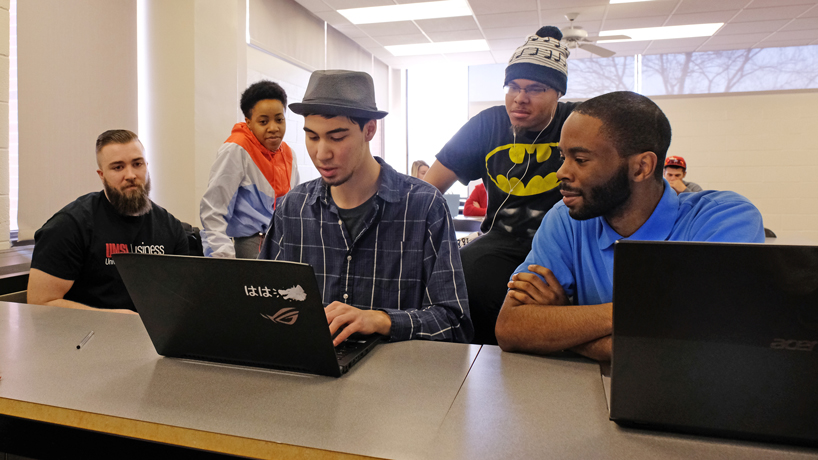
Perry Drake, co-chair and assistant teaching professor of marketing; Michael Elliott, associate dean of the College of Business Administration; and Dan Lauer, director of UMSL Accelerate, led an effort to add an entrepreneurship requirement for all incoming freshman and transfer students pursuing a BS in business administration or a BS in accounting. The new three-credit-hour course in entrepreneurship will teach students about launching and scaling a new venture by focusing on a single, topical entrepreneurial opportunity. (Photo by August Jennewein)
The University of Missouri–St. Louis’ entrepreneurial spirit is frequently on display, whether students are competing in the Entrepreneur Quest Student Accelerator Pitch Competition or serving as interns with fledgling companies establishing their space in the marketplace through the Anchor Accelerator.
These programs are sponsored by UMSL Accelerate – another example of the university’s commitment to fostering entrepreneurship. However, in the past, it was up to UMSL students to decide how much they wanted to learn about starting their own enterprise.
That’s changing.
Beginning next school year, all incoming freshman and transfer students pursuing a BS in business administration or a BS in accounting will be required to take a new three-credit-hour course in entrepreneurship. The class, ENT 3100: Applications of Entrepreneurship, will teach students about launching and scaling a new venture by focusing on a single, topical entrepreneurial opportunity.
Perry Drake, co-chair and assistant teaching professor of marketing; Michael Elliott, associate dean of the College of Business Administration; and Dan Lauer, director of UMSL Accelerate, led the effort to change the coursework requirements.
“We’re doing it because this entrepreneurial spirit and drive is so important in the community,” Drake said.
The group started working on approval for the course requirement about six months ago, but Elliott noted that a larger effort to invest in entrepreneurship education started about four years ago.
During that time, there was a push for an interdisciplinary entrepreneurship certificate. It was introduced in 2017 along with several classes focusing on areas such as the arts and non-profits. Drake, Elliott and Lauer built on that positive momentum.
“A couple years later, the faculty voted that entrepreneurship should be an emphasis area,” Elliott said. “That’s a big deal because that means it’s, in theory, equal to marketing, equal to finance, equal to the other major functional areas. But up to that point, we hadn’t required all our business students to take at least one course.
“We demonstrated there was a lot of interdisciplinary collaboration that could be made between finance and entrepreneurship, supply chain and entrepreneurship, and we got buy in from the rest of the faculty that entrepreneurship was more than just this niche specialty.”
Eventually, the discipline was grouped with marketing to form the Marketing and Entrepreneurship Department. By 2020, it wasn’t too difficult to get others on board with the new requirement. Drake and Elliott are excited about the change and believe an entrepreneurial mindset is important for students regardless of their discipline.
“Not everyone knows the importance of every class out there and why they need to take certain classes,” Drake said. “So we felt it was important to instill these skills to any BSBA student.”
The new course is being piloted this semester and will be taught by newly hired Assistant Teaching Professor Michael Kehoe. It will focus on applying entrepreneurship processes such as design thinking, ideation, market experimentation, revenue modeling and more. For this semester and next, students will work on developing a “better facemask in the age of COVID-19 and beyond.”
Elliott said discovery processes such as developing new ideas, conducting consumer research and focus groups and prototyping products are particularly important for students.
“There are so many opportunities now, but it’s important that our students understand how to test their ideas,” he said. “How to get that initial financing, communicate to different investors and understand the fundamentals of getting something started.”
Drake added that those lessons are important in the St. Louis business community.
“Understanding that whole entrepreneurial mindset – how to start a business – is doubly important in the St. Louis region because we are such a big startup community,” he said. “Because so many of our students stay here, you want to make sure they’re well equipped to work in that environment.”
Even if students don’t go on to start their own businesses, the concepts will be valuable in the corporate world, as well. The class will provide building blocks for students to work on cross-departmental teams and to innovate within larger companies. It will also provide a beneficial link to co-curricular activities such as the EQ Student Accelerator and internships.
Drake and Elliott are confident a basis in entrepreneurship will help students leverage their skills into bright careers – no matter what area of business they’re studying.
“I think students have more of an advantage today than they did let’s say 10 years ago because of what technology can do for them,” Drake said. “There are certain students that understand how to take that technology and utilize it to build out something, but there’s still a lot of students that don’t understand the power of some of that stuff. That’s what this class is going to help them do.”














